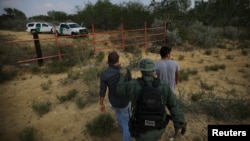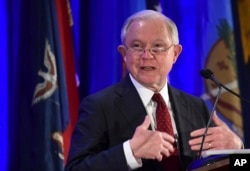U.S. Attorney General Jeff Sessions on Friday announced a “zero-tolerance” policy on illegal border crossings into the United States, directing federal prosecutors along the southern border to take up all cases of illegal entry referred by the Department of Homeland Security.
In a one-page memo, Sessions urged U.S. Attorneys in the border states of Arizona, California, New Mexico and Texas “to adopt immediately a zero-tolerance policy for all offenses referred for prosecution” under laws that make it a crime to enter the United States without proper documents.
“This zero-tolerance policy shall supersede any existing policies,” Sessions wrote. “If adopting such a policy requires additional resources, each office shall identify and request such additional resources.”
Late Friday, President Donald Trump signed a memorandum ordering an end to the policy known as “catch and release.” Under the policy, illegal immigrants are released from detention while awaiting a court hearing.
Trump had made ending the policy a campaign promise during the 2016 U.S. presidential election.
Last April, Sessions sent a memo similar to his Friday memo to U.S. Attorneys around the country, asking them to expand immigration prosecutions. But the directive gave them a measure of discretion in bringing criminal charges against an unlawful border crosser.
“This time it’s clear that any referral from DHS needs to be prosecuted to the extent practicable,” a Justice Department official explained, speaking on condition of anonymity.
In announcing the new policy, Sessions cited Department of Homeland Security data released Thursday showing a 203 percent increase in illegal border crossings from March 2017 to March 2018 and a 37 percent increase from February to March of this year — the largest month-to-month rise in seven years.
“The situation at our Southwest border is unacceptable,” Sessions said in a statement. “Congress has failed to pass effective legislation that serves the national interest — that closes dangerous loopholes and fully funds a wall along our southern border. As a result, a crisis has erupted at our Southwest border that necessitates an escalated effort to prosecute those who choose to illegally cross our border.”
Randy Capps, research director at the nonpartisan Migration Policy Institute in Washington, said the surge in the arrest of illegal border crossers in March was “in keeping with the typical seasonal pattern of higher apprehensions during the spring and early summer, and lower apprehensions in the late summer, fall and winter.”
The new policy is the latest initiative Sessions has announced as part of what he last year termed the “Trump era” in immigration enforcement.
President Donald Trump on Wednesday signed a proclamation directing the National Guard to deploy to the Mexican border to fight illegal immigration.
Trump said Thursday that he would deploy 2,000 to 4,000 National Guard troops to the border and keep them there until a border wall is built to keep out illegal border-crossers.
The National Guard is under the dual control of state and federal governments. To deploy the troops, Trump needs the states’ consent.
The Republican governors of Arizona, New Mexico and Texas have backed the planned deployment, but California’s Democratic governor remains undecided.
This story was written by VOA's Masood Farivar.


